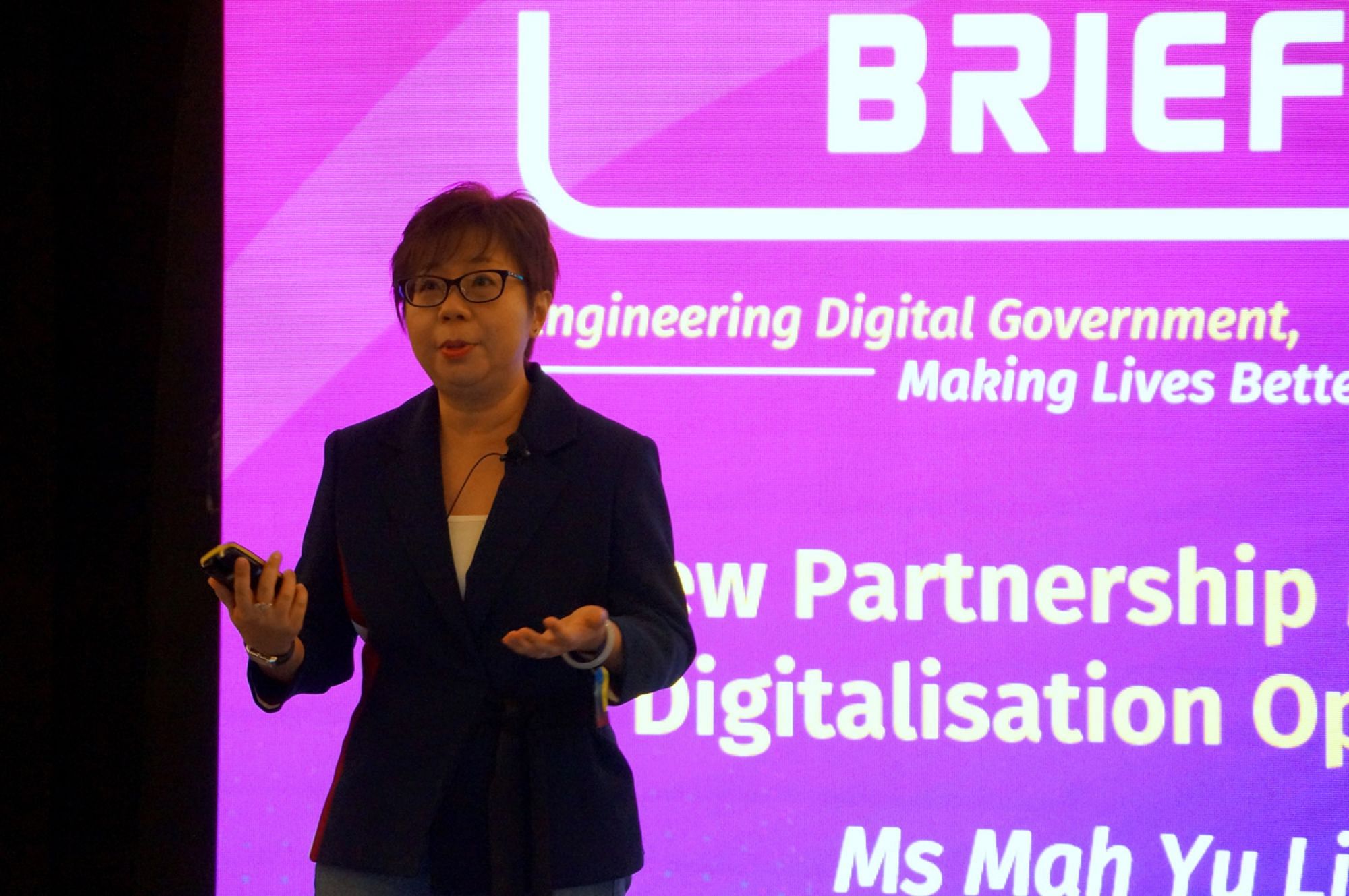BRANDED CONTENT
Govt to award up to $3.5b in ICT contracts, 80% open to SMEs this year
Boost for small and medium-sized enterprises with more opportunities for collaboration and growth on government technology projects.

Projected spending on government ICT projects will increase by more than 30 per cent this financial year to support the country’s digital transformation and help businesses ride through Covid-19. PHOTO: GETTY IMAGES
Information and communications technology (ICT) players battered by the Covid-19 crisis will have more opportunities to grow their business in Singapore in the coming months.
To accelerate the country's digital transformation efforts and help these firms ride through the crisis, the Government will increase the total projected value of its ICT contracts for this financial year, which lasts from April this year to next March, by more than 30 per cent.
This will bring the total value of government ICT contracts for the year to $3.5 billion, a bump up from the previous year's $2.6 billion.
Eighty per cent of contracts offered will be open to small and medium-sized enterprises (SMEs), said the Government Technology Agency (GovTech) in a press release on Monday.
The agency is spearheading the implementation of the Digital Government Blueprint, a five-year plan outlining how technology will transform the way the Government serves the public.
The ICT projects offered this year will run the gamut across technology domains such as cloud computing, data analytics and communications infrastructure, and will build on the Government's efforts to co-develop technologies with industry players.
By partnering the industry in these areas, the Government hopes to harness technology to:
- Provide more citizen- and business-centric digital services;
- Develop new tech tools in response to Covid-19;
- Build digital services on cloud systems;
- Modernise the national ICT infrastructure; and
- Enhance public service capabilities in data analytics, artificial intelligence and sensors

More dynamism is being injected into procurement procedures to increase the flexibility of such collaborations, said Ms Mah Yu Ling, Director of Procurement at GovTech.
She identified three new partnership models that the Government is using to improve industry collaborations: dynamic contracts, integrated and inclusive calls for solutions, and a shift from outsourcing to co-developing.
Dynamic ICT contracts
Unlike past government ICT contracts that had only one point of entry, dynamic contracts allow suppliers to update prices and offer new products and services to the Government - without waiting for their contracts to expire.
"This gives us the flexibility and agility to react to changes and disruptions in technology, new players in the market, and new situations where there is an increase in demand," explained Ms Mah.
It will also give agencies faster access to newer technology and capabilities, and will lead to time savings of about three months each time this feature is used, she said.
Last year, GovTech piloted the use of dynamic contracts for two ICT bulk tenders - in co-development services and robotic process automation - amounting to more than $700 million.
SMEs made up more than half of the industry partners that secured a share of these dynamic contracts.
In FY2020, the Government will offer bulk tenders with dynamic contracts for services such as user experience design, agile development, application development, data science and artificial intelligence.
According to GovTech, these bulk tenders have a total projected value of $1.2 billion and will broaden opportunities for SMEs to participate in and win ICT contracts with government agencies.
Inclusive and integrated calls for solutions
To further accelerate the public sector's innovation journey, the Government is turning to a new, outcome-based procurement process for calls for solutions.
This new process is a departure from the usual procurement process in that it allows tenderers to propose solutions to achieve an agency's desired outcomes, rather than just meeting the Government's specifications.
Typically, agencies define the solution they require before calling a tender to get suppliers to bid based on the requirements specified.
With the new procurement approach, proposals that are shortlisted and contracts awarded can potentially move through stages of the project, from proof of concept to pilot and then deployment, without waiting for additional tender exercises.
Selected companies can bring in other industry partners to scale their prototypes at different stages of deployment. Government agencies can also refine the requirements of the project at each phase as more details of the project are released.
This new procurement model lowers the barriers of entry for SMEs that may have fewer resources to roll out their ideas on a larger scale.
"In the past, some companies would not qualify for the tender because they did not have the resources for larger-scale deployment upon award of the pilot or at later stages of the project," said Ms Mah.
To date, 12 public agencies have adopted this open innovation approach by issuing a total of 21 challenges on virtual crowdsourcing platforms Open Innovation Platform (OIP) and Innoleap.
These platforms connect and match business challenges with problem solvers, encouraging industry partners to develop innovative solutions to government problem statements.
Take, for example, the National Heritage Board (NHB). Through the OIP, NHB was able to tap the expertise of Vouch SG, a start-up that offers digital concierge services, to create seamless and personalised experiences for tourists.
Vouch SG founder Joseph Ling added: "The procurement approach via the OIP allowed us to access new and unique opportunities from agencies we had not worked with before while providing flexibility throughout the entire development process from prototype to site testing."
Teamwork makes the team work
To improve its digital services, the Government is also shifting from outsourcing projects to co-developing them with industry partners.
Before, the Government would issue contracts with specifications of projects spelt out at the start and expect suppliers to develop these solutions independently.
"This may not be optimal as it could result in vendors developing solutions with outdated designs that cannot be changed in an agile manner or reused across government agencies," Ms Mah explained.
GovTech is now focusing on working with industry partners directly in trials to co-develop digital solutions tailored to their problem statements.
It has awarded 17 companies in a co-development tender to support public agencies that are embarking on Agile development projects. Agile is an umbrella term for methodologies with short feedback loops that enable products or solutions to be adjusted quickly in response to changing environments and situations.
These projects will require the suppliers to co-develop solutions with the Singapore Government Tech Stack (SGTS), a centralised platform that allows agencies to tap on a suite of tools and services to ensure consistency and quality of applications.
This marks a move from the "waterfall" method of development, where a linear approach is adopted, to an agile one that can be replicated for different solutions.
"We have seen better and faster results when we co-develop solutions using the SGTS," said Ms Mah.
"Our public agencies can learn from industry partners to improve their own in-house engineering capabilities, and industry partners will also be familiar with our practices and the technologies that we use to build our services," she said.
She stressed that GovTech welcomes partners of different sizes and areas of expertise and hopes to extend collaborations to other fields of emerging technologies.
As Singapore strives to become a Smart Nation, such partnerships will be key.
Ms Mah said: "All of these changes, from dynamic contracting to co-developing solutions, will give companies more opportunities as we move forward."
This article is part of a series by GovTech on the re-engineering of the Government's operating system to provide faster and better public services.


